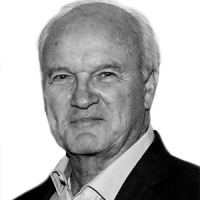NASHUA, New Hampshire — It was close to 1 in the afternoon yesterday when John Kasich walked into the large lobby of Nashua Community College where a couple hundred people, some sitting on folding chairs, others just standing, had come to listen to him explain why he wants to be president of the United States. He was using a hand-held microphone and stood in an area that resembled an aquarium with a two-story wall of glass behind him and the sun shining through, warming the lobby.
“I’ve learned a lot here. New Hampshire has taught me a lot,” Kasich was telling the crowd. “Learned a lot about myself and about us too, I think.”
And then he paused a moment before saying, “You know, we’ve got to slow down. There’s just so much going on around us that we’ve forgotten to pay attention to our neighbors, to other people. We have to slow down.
“There’s a lot of people who are just lonely. They have nobody to share their victories and they have nobody to share their tears. We have to slow down and listen to people, listen to each other. It’s important to pay attention to others, to our neighbors.”
Several in the crowd nodded as he continued to speak. He is the son of a postal worker and has the familiar, friendly look of a guy who carries a bag of mail down the block, knowing everyone on his route. He is one of three Republican governors on the ballot Tuesday and as with the other two—Christie and Bush—the impact of his office can be heard in most of the responses he provides to people asking questions in this, his 101st Town Hall in New Hampshire.
None of the senators running have to make decisions about getting a curb cut for a company relocating in their state. In Washington, the plague of drug abuse, the reality of death by overdose, the cheapness and availability of fentanyl and heroin, is an abstract talking point. A governor is on the line every day, all day. No voting present.
“I’m here because I’m kind of interested in him,” Patrick McKeown was saying. “I’m a ‘Bernie’ guy and my wife’s for Hillary but I’ve heard good things about this guy and I’m kind of curious.”
McKeown taught special education for 41 years in the Manchester public schools and has lived here most of his life. But he was born in Belfast, Northern Ireland, on St. Patrick’s Day so he knows a bit about broken governments and political systems well beyond polarization.
“It doesn’t work,” he said, standing at the back of the lobby as Kasich spoke. “It seems like nothing works. We need something new. That’s why I’m for Bernie.”
On Sunday, the players—the voters—were a day away from taking the field. As always, there is late movement in New Hampshire across the last 48 hours as people focus on Tuesday’s ballot. They will show up in record numbers here, carrying the same anxieties, hopes, worries, concerns, and fears that can be found anywhere in the land.
Yesterday, on a splendid February afternoon with a warming sun and a cloudless blue sky, those seeking the nomination had appearances across the state. Bernie Sanders drawing a huge crowd. Jeb Bush attracting increased attention. Kasich too. And Chris Christie, less than 12 hours removed from crushing Marco Rubio in a sustained assault during Saturday night’s debate, walked into Shooter’s Pub in Exeter, New Hampshire, a couple hours before kickoff in Santa Clara, where the Broncos faced Panthers in Super Bowl 50.
“Did last night with Rubio remind you of Roberto Duran sitting on his stool and saying ‘No mas,’?” Christie was asked, the question centered on Duran, then world welterweight champ, being unable to answer the bell after being pummeled by Sugar Ray Leonard in a 1980 title bout.
“Not really,” Chris Christie said. “But I’ll tell you something. Remember what Mike Tyson said? ‘Everyone has a plan until they get hit in the face.’ That’s Marco.”
Then he was off, out the door, one more stop before kickoff. One more day until the tale of the tape will tell us who survives and who goes home.






